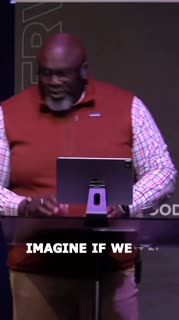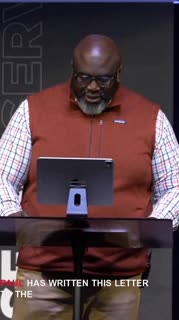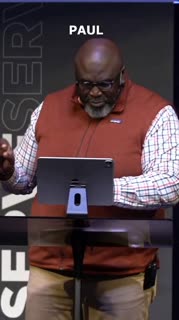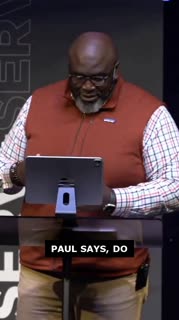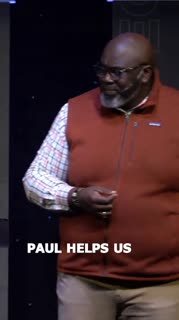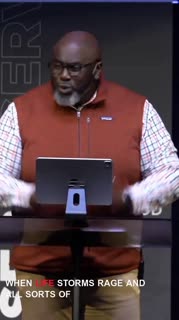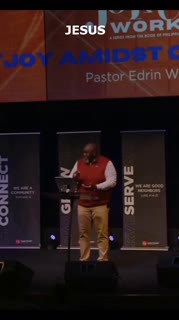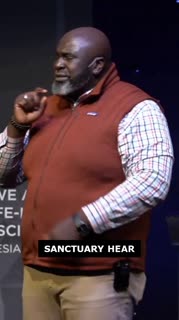Finding Joy and Unity in Conflict
Summary
In today's gathering, we explored the profound theme of finding joy amidst conflict, drawing from Philippians 4:1-3. We began by reflecting on the power of starting our day with praise, acknowledging God's greatness before anything else. This sets the tone for a life centered on God's presence, even amidst the chaos of our daily lives. We then delved into Paul's heartfelt letter to the Philippians, written from a Roman jail cell, where he emphasizes steadfastness and unity. Paul, in his "long goodbye," reminds the Philippians of his deep love for them, urging them to stand firm in the Lord and to resolve conflicts with love and humility.
Paul's letter highlights the conflict between Euodia and Syntyche, two women in the Philippian church. He urges them to be of the same mind in the Lord, emphasizing that conflict is inevitable but can be navigated with grace and love. Paul assigns roles in conflict resolution, urging the church to be objective, prayerful, and loving, and calls on a specific leader to mediate. He affirms both women, reminding them and the church that their identity in Christ remains intact despite their disagreements.
The message underscores that the church is not a place for perfect people but a community where imperfect individuals strive for reconciliation and unity. Our identity in Christ allows us to disagree without destroying one another, and our joy is not dependent on circumstances but on our relationship with Jesus, who holds the church together. As we navigate conflicts, we are reminded to thank God for Jesus, who is our peace and common ground.
Key Takeaways:
1. Start with Praise: Beginning each day by acknowledging God's greatness can transform our perspective, setting a foundation of gratitude and focus on God's presence before the distractions of the day take hold. This practice can reorient our hearts and minds towards God's goodness and faithfulness. [46:13]
2. Conflict is Inevitable: Conflict is a natural part of life, even within the church. It is not the absence of conflict that defines us but how we handle it. Christian maturity is demonstrated in our ability to seek reconciliation and peace, even when disagreements arise. [01:15:59]
3. Roles in Conflict Resolution: In conflicts, different people have different roles. Some are directly involved, while others are called to mediate or support. Being objective, prayerful, and loving are essential attitudes for everyone involved, ensuring that the resolution process is guided by Christ-like humility and love. [01:23:08]
4. Identity in Christ: Our identity in Christ remains unchanged despite conflicts. We are reminded that our worth and standing before God are not determined by our disagreements but by our relationship with Jesus. This perspective helps us approach conflicts with grace and understanding. [01:26:40]
5. Jesus Holds the Church Together: Ultimately, it is Jesus who holds the church together. Our unity and peace are found in Him, not in our efforts or circumstances. In times of conflict, we can find joy and assurance in knowing that Jesus is our foundation and strength. [01:29:05]
Youtube Chapters:
[00:00] - Welcome
[46:13] - Starting the Day with Praise
[47:57] - Acknowledging Our Need for God
[48:58] - Reflecting God's Goodness
[49:48] - Healing and Transformation
[51:12] - Introduction and Announcements
[54:14] - Transition and Prayer
[57:35] - Reading from Philippians 4
[01:02:09] - The Long Goodbye
[01:02:49] - Paul's Love for the Philippians
[01:03:54] - Standing Firm in the Lord
[01:05:41] - Letting Love Get in the Way
[01:07:57] - Remembering Paul's Teachings
[01:11:05] - Conflict in the Church
[01:15:59] - Joy Amidst Conflict
[01:29:05] - Jesus Holds the Church Together
[01:36:27] - Invitation and Closing Prayer
Study Guide
### Bible Study Discussion Guide
#### Bible Reading
- Philippians 4:1-3
---
#### Observation Questions
1. What specific conflict does Paul address in Philippians 4:1-3, and who are the individuals involved? [57:35]
2. How does Paul express his affection for the Philippian church in his letter, and what terms does he use to describe them? [01:03:54]
3. What roles does Paul assign to different people in the conflict resolution process within the church? [01:23:08]
4. How does Paul affirm the identity of Euodia and Syntyche despite their disagreement? [01:26:40]
---
#### Interpretation Questions
1. Why does Paul emphasize the importance of standing firm in the Lord amidst conflict, and how does this relate to the overall message of Philippians? [01:07:57]
2. How does Paul's approach to conflict resolution in the church reflect his understanding of Christian maturity and unity? [01:15:59]
3. In what ways does Paul suggest that the church's identity in Christ should influence how conflicts are handled? [01:28:02]
4. How does the sermon illustrate the idea that Jesus is the one who holds the church together, especially during times of conflict? [01:29:05]
---
#### Application Questions
1. Reflect on your daily routine. How can you incorporate starting your day with praise to transform your perspective and focus on God's presence? [46:13]
2. Think of a recent conflict you experienced. How did you handle it, and what could you have done differently to seek reconciliation and peace? [01:15:59]
3. Consider a conflict you are currently facing. What role do you think you should play in resolving it, and how can you approach it with objectivity, prayer, and love? [01:23:08]
4. How does your identity in Christ influence the way you view and interact with others during disagreements? [01:26:40]
5. Reflect on a time when you felt the church community was held together by Jesus. How did that experience impact your faith and understanding of unity? [01:29:05]
6. Identify a specific relationship in your life where conflict is present. What steps can you take this week to work towards resolution and maintain the main focus on Christ? [01:25:28]
7. How can you remind yourself and others in your church community that Jesus is the foundation and strength during times of conflict? [01:30:27]
Devotional
Day 1: Begin with Praise to Transform Your Day
Starting each day with praise can profoundly impact your perspective and set a foundation of gratitude. By acknowledging God's greatness before anything else, you align your heart and mind with His presence, allowing His goodness and faithfulness to guide you through the day's challenges. This practice helps you focus on what truly matters, reorienting your thoughts away from distractions and towards a life centered on God's presence. As you cultivate this habit, you may find that your days are filled with more peace and joy, regardless of external circumstances. [46:13]
Psalm 59:16-17 (ESV): "But I will sing of your strength; I will sing aloud of your steadfast love in the morning. For you have been to me a fortress and a refuge in the day of my distress. O my Strength, I will sing praises to you, for you, O God, are my fortress, the God who shows me steadfast love."
Reflection: How can you incorporate a moment of praise into your morning routine to set a positive tone for your day?
Day 2: Embrace Conflict as an Opportunity for Growth
Conflict is an inevitable part of life, even within the church community. It is not the absence of conflict that defines us, but how we handle it. Christian maturity is demonstrated in our ability to seek reconciliation and peace, even when disagreements arise. By approaching conflicts with grace and love, we can navigate them in a way that strengthens relationships and fosters unity. Remember that conflict can be an opportunity for growth, both personally and within the community, as it challenges us to practice humility and understanding. [01:15:59]
Proverbs 15:18 (ESV): "A hot-tempered man stirs up strife, but he who is slow to anger quiets contention."
Reflection: Think of a recent conflict you experienced. How can you approach similar situations in the future with a mindset of reconciliation and growth?
Day 3: Understand Your Role in Conflict Resolution
In any conflict, different people have different roles. Some are directly involved, while others are called to mediate or support. Being objective, prayerful, and loving are essential attitudes for everyone involved, ensuring that the resolution process is guided by Christ-like humility and love. By understanding your role, whether as a participant or a mediator, you can contribute to a peaceful and constructive resolution. This approach not only helps resolve the immediate conflict but also strengthens the bonds within the community. [01:23:08]
James 3:17-18 (ESV): "But the wisdom from above is first pure, then peaceable, gentle, open to reason, full of mercy and good fruits, impartial and sincere. And a harvest of righteousness is sown in peace by those who make peace."
Reflection: Consider a conflict you are currently facing or have faced in the past. What role can you play in bringing about a peaceful resolution?
Day 4: Root Your Identity in Christ
Our identity in Christ remains unchanged despite conflicts. We are reminded that our worth and standing before God are not determined by our disagreements but by our relationship with Jesus. This perspective helps us approach conflicts with grace and understanding, knowing that our true identity is secure in Him. By focusing on our identity in Christ, we can navigate disagreements without allowing them to define us or damage our relationships. This understanding fosters a spirit of unity and love within the community. [01:26:40]
Colossians 3:12-13 (ESV): "Put on then, as God's chosen ones, holy and beloved, compassionate hearts, kindness, humility, meekness, and patience, bearing with one another and, if one has a complaint against another, forgiving each other; as the Lord has forgiven you, so you also must forgive."
Reflection: How does your identity in Christ influence the way you handle conflicts and disagreements in your life?
Day 5: Trust in Jesus to Hold the Church Together
Ultimately, it is Jesus who holds the church together. Our unity and peace are found in Him, not in our efforts or circumstances. In times of conflict, we can find joy and assurance in knowing that Jesus is our foundation and strength. By trusting in Him, we can navigate challenges with confidence, knowing that He is working to bring about reconciliation and unity within the church. This trust allows us to focus on building a community that reflects His love and grace. [01:29:05]
Ephesians 4:15-16 (ESV): "Rather, speaking the truth in love, we are to grow up in every way into him who is the head, into Christ, from whom the whole body, joined and held together by every joint with which it is equipped, when each part is working properly, makes the body grow so that it builds itself up in love."
Reflection: In what ways can you actively contribute to the unity and strength of your church community, trusting in Jesus as the foundation?
Quotes
1. "Imagine if we started our day with just that praise. Before we opened Facebook or Instagram, before we even reached over and kissed our significant other with the morning breath, which is a ministry in itself. What if the first words out of your mouth in the morning is, great are you, Lord. Great are you, Lord. Before we notice that our back is hurting or remember how many meetings we had that day, what if the first word out of our mouth was, great are you, Lord." ([00:46:07] (49 seconds)
)
2. "Paul has written this letter to the church and he has written this letter to the church. Church that means so much to him and he has finally reached the final section of this letter and Paul has said much of what he intends to say he has warmly greeted the believers in Philippi and he has told them over and over how much he loves them he's already expressed gratitude for the many ways they have blessed him and been an encouragement to him in helping to spread the gospel of Jesus Christ." ([00:59:25] (32 seconds)
)
3. "Paul extends his time in this book by saying, as we'll read in verse one of Philippians chapter four, Therefore, my brothers and sisters, whom I love and long for, my joy and crown, stand firm in the Lord in this way, dear friends. It is essential for us. If we're going to understand what is actually being said in the book of Philippians, to know and remember that Paul has a deep love for the people he's writing to." ([01:03:54] (29 seconds)
)
4. "Paul says, do you remember that I said that true righteousness and identity are not found in how well you keep the law or in your achievements, but in Christ alone? Do you remember that I said that? Do you remember that I said that? Do you remember that I said that? Do you remember that I said that? I said your credentials and your accomplishments are worthless in comparison to knowing Christ and being united with him." ([01:08:28] (22 seconds)
)
5. "Paul acknowledges the conflict and he points towards a clear goal. Paul names this situation, which the church would have known about. And he names these two leaders who were at odds. They were at odds with one another. And this is important for us, church, because it reminds us that you can love Jesus and you can be committed to the church. And you can have a genuine desire to grow in your faith." ([01:15:38] (31 seconds)
)
6. "Paul gives us some guidelines for how to have joy in conflict. He acknowledges the issue. He assigns specific roles to specific people. And here's the last thing Paul does. Paul affirms both women, even as they struggle through this issue. Paul doesn't say to these women, figure it out, and then I'm going to love you the way I love you. I love the rest of the Philippian church." ([01:23:28] (27 seconds)
)
7. "Paul helps us to see that our peace with God ought to be expressed by our unrelenting desire to be at peace with one another. This matters to us, Sanctuary, because it is only our identity in Christ and our oneness as brothers and sisters in Christ that allows us to be at peace with one another. It allows us to disagree with one another without needing to destroy one another." ([01:27:11] (33 seconds)
)
8. "When life storms rage and all sorts of trials, come our way, when the world seems to be set against us, I thank God that Jesus holds his church together. When we're fighting and having our own internal struggles, it's Jesus who holds the church together. When we have our misunderstanding sanctuary, it's Jesus who holds the church together." ([01:30:12] (26 seconds)
)
9. "Jesus is the tie that binds us together. Jesus is the wheel in the middle of the wheel. Jesus is the one who holds us where we can't even hold ourselves. In every situation, in every circumstance, come what may, I thank God for Jesus because it's Jesus who holds the church together." ([01:31:00] (26 seconds)
)
10. "Sanctuary hear me when I say this you and I are called to joy and that joy is not dependent on our circumstance and Paul tells these two women in the midst of their conflict to turn their eyes and their attention on Jesus the one who is able to hold it all together." ([01:33:41] (29 seconds)
)
